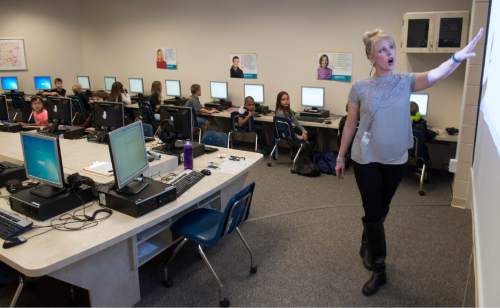This is an archived article that was published on sltrib.com in 2016, and information in the article may be outdated. It is provided only for personal research purposes and may not be reprinted.
Standardized testing is "pretty much worthless," measuring how good a child is at taking tests instead of what or how well a student is learning, Vicki Healy said.
A retired teacher and Taylorsville resident, Healy said annual testing and strict school standards have made public education focus on technology and consistency while minimizing the interaction between educators and their classrooms.
"It's almost like they wanted to make it all teacher proof," she said. "Like we're moving toward having a machine teach our kids."
Healy isn't alone in her criticism.
A survey of 1,500 likely Utah voters found opposition to the state's use of SAGE testing and the Common Core State Standards.
Among respondents, 46 percent said schools should stop using SAGE, a computer-adaptive exam taken by students each spring, and 51 percent said Utah should abandon the Common Core, which outlines minimum grade-level expectations in math and English.
Utah's continued use of SAGE and Common Core was supported by 25 percent and 27 percent of survey participants, respectively, with 28 percent and 22 percent saying they were not sure if schools should continue using the tests and standards.
The poll was performed by SurveyUSA for The Salt Lake Tribune and the Hinckley Institute of Politics at the University of Utah. It was conducted between June 2 and June 8 and has a margin of error of plus or minus 2.6 percentage points.
Critics frequently — and inaccurately — describe Utah's test and standards as federal programs, including Republican gubernatorial candidate Jonathan Johnson, who has made opposition to SAGE and Common Core a focal point of his campaign.
Hinckley Institute Director Jason Perry said the large number of poll participants who answered "not sure" suggests continued confusion about what the tests, and the standards they're based on, are.
"These words tend to be used in sound bites," Perry said. "But many in the community at large simply don't understand the terms."
Despite the low approval numbers, SAGE and Common Core have defenders in the state.
Salt Lake City resident Eric Green said he likes that his children's math homework relies on word problems and regularly refers back to concepts taught earlier in the year.
The standards emphasize analysis over memorization, and assignments often encourage students to use different methods to arrive at the same answer.
"It's a dramatically better way of teaching math than what I saw when I was an elementary student," he said.
Green also said it's helpful to see how children compare to their peers, which requires students to take a uniform assessment.
"Standardized testing, in general, is a good way for parents to know what is going on with their kids," he said.
Ryan Edwards, of West Valley City, described Common Core math as "silly," and he said the state would be better off developing unique standards for its schools.
"We pay the taxes," he said. "We should come up with our own standards."
He said he might be able to support SAGE testing if the scores were used differently.
"They just record all the data in a giant spreadsheet and nobody does anything with it," Edwards said, and students advance to the next grade level whether they score high or low on the exam.
Federal law requires annual testing in grades three through eight and at least once in high school in exchange for education funding.
In addition, Utah relies on SAGE scores as the basis for the state-mandated school-grading and school-turnaround programs.
Scores cannot be used to grade students, but they were used in teacher evaluations to determine merit pay until recently.
Rep. Marie Poulson, D-Cottonwood Heights, sponsored a bill to exclude test scores from teacher evaluations, as well as another bill giving school districts the option of using ACT exams in place of SAGE testing for high school juniors.
The state school board recently voted to end SAGE testing for all high school students, pending approval by lawmakers.
Poulson, a former educator, said she supports a reduction of testing, but abandoning SAGE at all grade levels would either violate federal law or require a replacement test.
"Most teachers would be reluctant to end SAGE completely," she said, "only because they know something else would be coming."
Most states adopted the Common Core, which Poulson said provides a level of educational consistency across state lines.
But she said the new approach to math has led to complaints as confused parents struggle to help children with their homework.
"Common Core math isn't what most people have done themselves," she said.
State school board Chairman David Crandall said the state's contract with SAGE provider American Institutes for Research expires next year.
The test will be administered next spring, he said, but beyond that, it is unknown whether SAGE or a new exam will be used.
The school board also has revised Utah's math and English standards since adopting the Common Core in 2010 and voted to accelerate its scheduled update of those standards if lawmakers provide additional funding for review.
"We do and will continue to have a standards-based educational system," Crandall said. "Standards development can be costly, but it can also have a high reward."
Opposition to SAGE and Common Core was high among all age groups, education levels, regions of Utah and for men and women, according to the poll.
Independents and Republicans preferred ending SAGE and Common Core, while Democrat and Democrat-leaning Utahns were more likely to support the continued use of the test and standards in public schools.
The only group to show majority support for the Common Core was "strong" Democrats, with 51 percent saying the standards should continue.
Twitter: @bjaminwood



